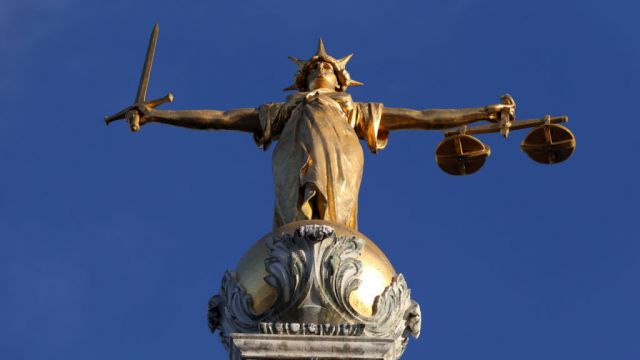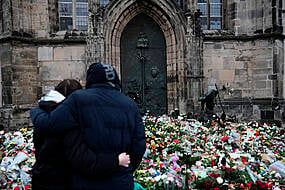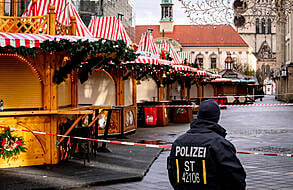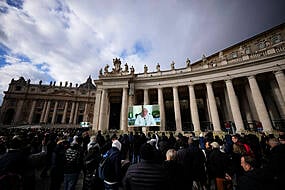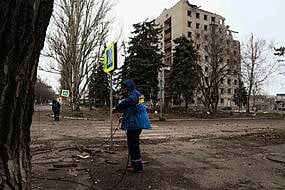A senior Nigerian politician plotted to transport a poor street trader to the UK to donate a kidney to his daughter in exchange for up to £7,000 (€7,800) and the promise of a better life, a court has heard.
Ike Ekweremadu (60) allegedly conspired with family members and others to exploit the 21-year-old man to harvest his body part.
The then-deputy president of the Nigerian Senate is on trial at the Old Bailey in London alongside his wife Beatrice Ekweremadu (56), their 25-year-old daughter Sonia and medical “middleman” Dr Obinna Obeta.
It is claimed Sonia Ekweremadu was to have been the recipient of the victim’s kidney in an £80,000 private transplant operation at the Royal Free Hospital in Hampstead, north London.
As part of the alleged plot, “elaborate” steps were taken to create the false impression that Sonia and her proposed donor were cousins, it is claimed.
Opening their Old Bailey trial on Monday, Hugh Davies KC said Ike Ekweremadu and his wife were powerful figures in Nigerian society.
But all their status, influence, wealth and international connections could not guarantee the good health of their family, jurors were told.
Sonia had a “significant and deteriorating” kidney condition which could be managed through dialysis, but cured with a transplant.
While it is lawful for someone to donate a kidney, it is criminal to reward someone for doing so, jurors were told.
The Ekweremadus allegedly set about finding a donor, enlisting the help of Dr Obeta, a former medical school classmate of Ike’s brother Isaac “Diwe” Ekweremadu, who remains in Nigeria.
In 2021, Dr Obeta had himself undergone a kidney transplant in the UK, with the donor travelling from Nigeria claiming to be his cousin, jurors were told.
Dr Obeta had distributed a GoFundMe page quoting £60,000 for the private procedure, some £20,000 less than the cost of Sonia’s transplant had it gone ahead, it was alleged.
On September 8th, 2021, Diwe Ekweremadu allegedly messaged Ike that he would brief him following “extensive discussions” with his “classmate who had his transplant last month”.
He goes on to say the classmate would need some £2,000 to start the search for candidates and testing.
The following month, messages between Diwe Ekweremadu and Dr Obeta – forwarded to Ike – revealed that potential donors would travel for screening at a lab in the capital city, Abuja.
The 21-year-old donor was among them, having been recruited by an acquaintance at a Lagos street market who turned out to be Dr Obeta’s kidney donor, the court was told.
At the time, he was making just a few pounds a day selling telephone parts from a cart.
Mr Davies said that the young man’s account was that he believed he was being taken to London to work and the tests were for a visa.
The prosecutor said Dr Obeta was controlling the process in Nigeria and regularly updating Diwe Ekweremadu, who was, in turn, updating his family.
Mr Davies told jurors that messages referred to the nameless donor only as “this guy” and made no mention of any act of “extraordinary selfless altruism”.
He added: “In the real world altruistic donors are an exceptionally rare commodity: those willing to provide organs for reward are not. They are often young, intrinsically economically disadvantaged, young men.”
Under the agreement, the young man was to be paid either £2,400 or £7,000 in Nigerian Naira plus the promise of work and the opportunity to be in the United Kingdom, the prosecution alleged.
But Mr Davies told jurors: “Relative to the wider medical costs of the process – measured in tens of thousands of pounds – which would have been done privately, his reward was to be a small fraction of the whole.
“To him – a street trader from Lagos – these sums and rewards were significant.”
Mr Davies said other potential donors in Nigeria had been reviewed for suitability before he was identified.
And when the organ transplant did not go ahead in London, steps were taken to arrange a transplant operation in Turkey with a different donor, it was claimed.
Once the street trader was found to be a suitable match, he was transported to London in February 2022 under the “direction and financial control” of the alleged plotters, Mr Davies said.
As part of the deception, the young man was purported to be Sonia’s cousin, with the family connection used to get a temporary visa to travel to the UK, the court was told.
Photographs were taken of Sonia and the donor together and they exchanged text messages as part of the ruse, jurors were told.
The donor was allegedly coached to give false answers to doctors at the Royal Free Hospital and Sonia was “singing from the same hymn sheet” to create a fake family history, Mr Davies said.
Jurors were told how the donor stayed with Obeta in London having been escorted to the UK by Diwe Ekweremadu.
An initial meeting with a consultant at the hospital was put off because the donor’s English was limited.
A long-standing staff member at the Royal Free Hospital who spoke Igbo offered to act as an interpreter at a rescheduled meeting on February 24th.
Mr Davies told jurors: “Somewhat extraordinarily, according to messages between other people, she appears to have agreed to accept, in obvious breach of their professional role, £1,500 after this meeting in order to manipulate a second meeting to the advantage of the family.”
After speaking to the young man, the consultant concluded he was not an appropriate donor.
Jurors were told that he did not understand until his first appointment that he was there for a kidney transplant.
He was said by the consultant to have “limited understanding” of what he was there for and had expressed an intention to study for his GCSEs.
He was noted as being “visibly relieved” on being told the transplant would not go ahead.
Mr Davies said: “More widely, the prosecution contends that (the donor) was subject to a high degree of control throughout and was dependent on what he was told for his understanding.”
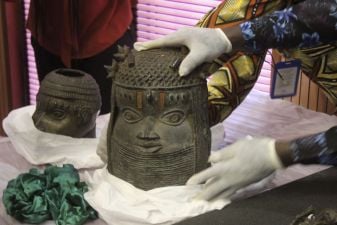
The jury was told Sonia Ekweremadu has not had a kidney transplant and remains on dialysis.
The three Ekweremadus, from Willesden Green, north-west London, and Obeta (50), from Southwark, London, deny conspiring to arrange or facilitate the travel of the young man with a view to exploitation between August 1st, 2021, and May 5th, 2022.
The trial continues.
